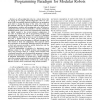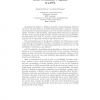1552 search results - page 68 / 311 » Concepts and Concept-Oriented Programming |
PLDI
2010
ACM
14 years 3 months ago
2010
ACM
Low-level program analysis is a fundamental problem, taking the shape of “flow analysis” in functional languages and “points-to” analysis in imperative and object-oriente...
AOSD
2005
ACM
14 years 3 months ago
2005
ACM
In this paper we propose an extension to JAsCo for supporting Adaptive Programming in a Component-Based Software Development context. JAsCo is an aspect-oriented programming langu...
JSA
2000
13 years 9 months ago
2000
In this article, the problem of finding a tight estimate on the worst-case execution time (WCET) of a real-time program is addressed. The analysis is focused on straight-line code...
ROBOCOMM
2007
IEEE
14 years 4 months ago
2007
IEEE
—A self-reconfigurable robot is a robotic device that can change its own shape. Self-reconfigurable robots are commonly built from multiple identical modules that can manipulat...
PSSE
2004
Springer
14 years 3 months ago
2004
Springer
“demonic” nondeterminism, representing abstraction from (or ignorance of) which of two program fragments will be executed. By introducing probabilistic nondeterminism into GCL,...


